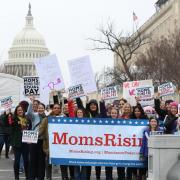Games are a time-honored way of expanding people's knowledge.
My mom, who was a single mother throughout my elementary school years, played games with my brother and I in the grocery store when we were young to help make the price right for purchasing our family food on a very limited budget.
When we went to the store, my mom would hold contests between my brother and I to see who could find the items on our grocery list in the least expensive brand, and to see who could find the sale items on the coupon list the fastest. At the time, I thought my mom was the only one who played this particular game.
Looking back, I now know my mom was far from alone.
We all play games with our kids--it's just not always of the board game variety. Too many moms are barely making ends meet, and sometimes parents try to hide their worries from their children within games--pretending that shopping for food on an overstretched budget is a game or that the electricity being shut off is just an opportunity for "indoor camping." But dealing with financial woes is never fun.
Parents across the nation are working hard, playing by the rules, and still struggling to put food on the table.
In fact, yesterday the Census Bureau released a report stating that 46.5 million people are living in poverty, and earlier this month a USDA report stated that 14.5% of U.S. households struggled to put food on the table in the past year.
Many parents are feeling the stretch of their wallets so much so that they can't concentrate on playing fun games with their children and instead need to play hide and seek with their financial problems.
Moms, like Lorraine, know this reality all to clearly: "I was a middle class hard-working professional, until my marriage ended around the same time as the recession hit. The publications I wrote for closed down or ran out of funding. I suddenly became the unemployed single mother of two girls, ages 4 and 7. [After endless job searching and selling off many of my possessions] a close friend suggested I apply for food stamps. His family had used them. At first I was appalled. I always imagined food stamps were only for the poor and the homeless. I couldn't conceive that someone like me could qualify. Then I realized: I was poor! That night, thinking of my girls, I piggybacked off of the neighbors' wireless signal and Googled "how to apply for food stamps. A few weeks later, it was a huge relief to trudge up the stairs to my apartment with my happy kids, carrying bags of fresh groceries. It felt better than Christmas. These are tough times, and I learned the hard way that pride doesn't put a warm meal on the table, but that the Supplemental Nutrition Assistance Program (SNAP) does."
Luckily nutrition programs were available for Lorraine and her two daughters.
But those programs are now in jeopardy.
Unfortunately, right now, some in Congress are playing a game of a totally different type making it harder for moms like Lorraine to reach out for help. Legislation currently being considered in Congress proposes billions of dollars in cuts to vital safety net programs like SNAP, the Earned Income Tax Credit (EITC), Head Start, Child Care and Development Block Grant, and WIC.
Investing in these programs is a no-brainer and despite protests to the contrary, Congress' hands are not tied. To start, Congress can invest in our national economic well-being by prioritizing families living in poverty in their upcoming budget debate. According to the Center on Budget and Policy Priorities 70% of budget cuts geared at reducing the deficit have already come from program cuts, including many of the vital programs low- and moderate-income parents use to afford food, rent, medicine, and child care.
Congress can also untie their own hands and replace the across-the-board cuts in the sequester, which are currently harming millions of innocent children and limiting their future opportunities, with a budget deal that is balanced and fair. And, Congress can also agree that wealthy corporations and individuals must pay their fair share and budget cuts should not fall on the backs of our most vulnerable children and families.
If the proper steps are taken, it won't just be low-income families that win out, but our entire economy.
SNAP, for example, is incredibly beneficial not just to struggling families but also local economies. According to Moody's Analytics for every dollar of SNAP spent, $1.79 goes in to the local economy. Programs like SNAP, Unemployment Insurance, and the Earned Income Tax Credit (EITC) are incredibly stimulative to local economies because once benefits are received families tend to spend them right away at local businesses.
Moms care for our kids every day. Don't we have the right to expect our representatives in Congress to care for our nation, and take up the challenge of doing the hard work of substituting automatic budget cuts for a fair and balanced budget?
Moms love to play games with our kids, but we don't take kindly to Congress playing games with our kids' futures.
Originally published at the Huffington Post.


The views and opinions expressed in this post are those of the author(s) and do not necessarily reflect those of MomsRising.org.
MomsRising.org strongly encourages our readers to post comments in response to blog posts. We value diversity of opinions and perspectives. Our goals for this space are to be educational, thought-provoking, and respectful. So we actively moderate comments and we reserve the right to edit or remove comments that undermine these goals. Thanks!